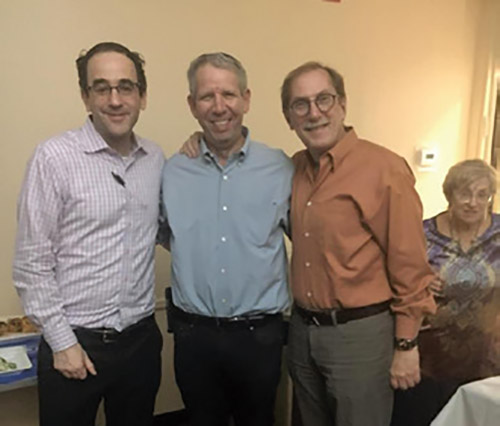
The Greater MetroWest community is launching a new Hebrew school called Kulanu. Kulanu, from the phrase “Kulanu Kedoshim,” or “We are all holy,” aims to provide Torah-based educational, spiritual and social programming to Jewish children in public school, including those who have left yeshiva, enabling them to feel more connected to their Jewish identity.
Recently, it has become apparent that many middle school and high school students in the MetroWest area are moving away from yeshiva education. There are a handful of reasons for this development, the most common being one of these: The cost of yeshiva day school has become difficult to manage. Many community members work multiple jobs and still can’t make ends meet with the ever-increasing cost of tuition. This in turn has caused many families to make the decision to move their children to public school. In some cases, students have specific social or academic needs and don’t necessarily qualify for a SINAI program or other resources yeshiva day schools provide, yet they still require some form of support. In other cases, some families simply no longer desire a full-time Jewish education. Whatever the reason, the number of kids leaving yeshiva is growing rapidly, compelling many community advocates to create a new model that will hopefully assist with these problems and concerns.
Co-founders/co-chairs Moshe Glick, Ira Bloom and Larry Rein, who together have worked on community outreach programs for many years, including the highly successful Shabbat Project this past November, which welcomed over 200 guests for Shabbat in West Orange, are spearheading the development of Kulanu. The program will offer public school students an opportunity two or three times a week to engage in Torah-based studies. It will also provide social opportunities for many kids who would otherwise be lost from the fold upon leaving yeshiva. The impact is particularly felt on Shabbat, when friends get together to socialize, and public school kids feel gradually removed from their former circles.
According to Glick, once these kids drop out of yeshiva, they are at risk to lose their social connections as well as their religious affiliations. “We want to create a vehicle for social and educational opportunities for kids who are no longer in yeshiva or who have never attended yeshiva,” he said. In order for these kids to live a Torah-observant lifestyle, Glick believes it is the responsibility of the community to provide the framework in which to do so.
“There are a growing number of children leaving yeshiva for a variety of reasons, as well as a large number of Jewish children who have not attended yeshiva. In addition, many attended afternoon Hebrew school, and typically do not continue past their bar/bat mitzvah. What is our communal responsibility towards these children? We strongly believe it is to ensure that they are connected to their Jewish heritage, maintain Jewish social connections and engage in Jewish learning. Our goal is to provide a spiritual life raft in a sea of assimilation,” explained Glick.
Kulanu is the first school of its kind locally and has been met with recognition and enthusiasm. Local rabbis support this proposal and realize that in today’s environment where the number of kids leaving yeshiva is on the rise, a program like Kulanu may be very much in demand. Glick and his co-chairs want to make it very clear that they are not advocating that students leave yeshiva. They unanimously agree that yeshiva education is a priority, but recognize that for many it is not viable.
“The model will work in partnership with community infrastructure. The objective is not to lure people away from yeshiva, but rather to offer those who have left an opportunity to preserve their Jewish affiliations as best as possible,” Glick explained. Kulanu’s goal is to inspire children to feel more connected to their Jewish heritage and grant them the opportunity to live committed Jewish lifestyles.
“Kulanu is a unique opportunity to keep the Jewish flame lit for those children who may not have the opportunity of formal Jewish education, the effects of which can last for generations to come. Making a positive difference in young people’s Jewish lives with the full support of the Orthodox Jewish community makes this endeavor not only worthwhile, but necessary,” said co-founder/co-chair Ira Bloom.
Both NCSY and The Friendship Circle are proponents of this endeavor. NCSY sends representatives into local public schools to visit Jewish student unions where they meet kids who identify as Jewish and would be ideal candidates for this program. Both organizations have agreed to assist in this mission.
The curriculum promises to be inspiring and interactive, led by dynamic and engaging rabbis and teachers who can connect with the kids and provide basic Jewish education. Enrollment will be open to all students, regardless of their educational background. Seed money has already been raised and no one will be turned away as a result of financial constraints. The program is still in the planning phase and hopes to launch at the beginning of the 2019-2020 academic school year.
A focus group to determine more specific community needs will be held on Sunday, January 27, at 7:30 p.m., at the home of Renee and Moshe Glick. As the focus group will be limited to 15-20 participants, please RSVP to any of the co-chairs: Ira Bloom, 973-868-9051, ibloom6@gmail.com; Moshe Glick, 973-865-2446, mglickus@gmail.com; or Larry Rein, 973-714-3951, reinlawrence@gmail.com.
By Andrea Nissel










